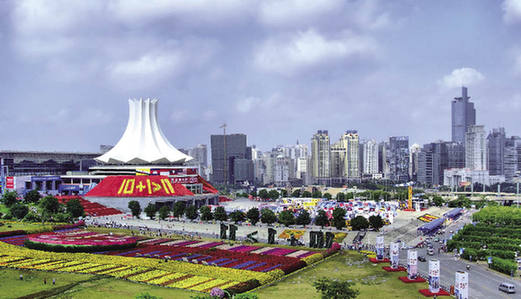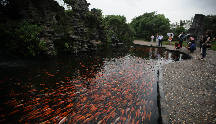Nanning: Comfort with Power
Nanning: Comfort with Power
By WU MEILING
THE city of Nanning is not too difficult to locate on a map; it can be found at the crossroads of three major regional economic spheres – the Southeast Asian, Guangzhou-Hong Kong-Macao, and South-Southwest China. As capital of Guangxi Zhuang Autonomous Region, Nanning functions as a pivot for the Guangxi Beibu Gulf Economic Zone. It is also a main outlet to the sea in Southwest China. In 2004 the city was made the host of the annual China-ASEAN Expo. In October 2007 it won the UN Habitat Scroll of Honor Award.
 |
|
The host city of the China-ASCEAN Expo has grown into an international metropolis. |
A World of Foliage
Nanning, also known by its ancient name "Yong," is located in the basin at the rim of the "Guangxi Arch" – a name given by famous geologist Li Siguang that refers to a bow-shaped range composed of the Duyang, Daming, Dayao and Jiaqiaoling mountains. Located on the upwind side of the slope and cooled by free flowing ocean breezes, the city's mild and wet climate is ideal for vegetation.
There is a lushness to Nanning, covered as it is in hues of refreshing and intoxicating greens. For centuries, the serenenity and beauty of the city has lured many men of letters to visit, admire and then extol its picturesque scenery.
Nanning's natural endowements – in particular the beautiful urban landscape – can be attributed more to man than to nature. Care and nurture from its inhabitants have helped bring out the best of her original nature. During the 1990s, the municipal government set a goal for developing Nanning into one of China's greenest cities. Foliage has since flourished, with bright splashes of flora at every corner. By the end of 2008, Nanning had become an evergreen city that some visitors described as a "city embraced by gardens and woods," and by others as one "that embraces gardens and woods." The praise has encouraged locals to work even harder in beautifying Nanning. Today within the 100-sq-km city proper, every street and road is kept perennially green; all-season foliage, woods and flowers frame its majestic mountains, rivers and lakes. The man-made scenery has blended organically with the local subtropical environment to create a unique city of "half woods and half buildings."
Though foliage erupts everywhere, people cannot fully savor the richness of Nanning's greens – mountains, rivers and vegetation – until they journey to the South Lake Park. A body of water takes up half of this subtropical enclave, extending over 100 hectares (as compared to the 191.91 hectares of the entire park). Skirting the banks of the lake are arrays of ancient and newer trees representing nearly 1,000 species. South Lake is the mostly frequented and cherished destination for local citizens and visitors to the region.
However, the park is not the largest green destination in the city. Mount Qingxiu (Lush and Elegant) is considered the lung of Nanning. More than 10 large and small peaks extend across a 10-sq-km area. The green woods of these mountains mingle with a brick and mortar forest, home to the soon to be completed ASEAN International Business Zone.
Nanning's people are happy with their cozy life in this picturesque urban center and proud of the many laurels that have been bestowed on it. The titles "Garden City of China," "UN Habitat Scroll of Honor," and the "China Habitat Award" are just some of the prestigious honors that they have earned and so love to recount.
A Diverse Metropolis
Nanning's cultural heritage is no less rich. In 1997, a farmer in Yongning County dug out stone axes, shell tools and bone awls when hoeing a hillside for cultivation. The following archaeological excavation revealed dwellings and tombs that confirmed beliefs that in the area's remote history a major human settlement was established here. Now the site, named Beiqiu (shell mound), on Dingshi Mountain has been turned into a museum. It parallels the Banpo remains of the Yellow River Valley and Hemudu remains of the Yangtze River Valley, forming a series of prime sites in China's Neolithic culture.
Favorable geographic conditions are key lures for human settlement, and a pleasant environment helps fostering an agreeable people. Visitors will feel at home in Nanning, bathing in the locals' hospitality and warmth while admiring their culture and scenery. In recent years an increase of foreign faces can be seen strolling Nanning's gorgeous streets, or at its many supermarkets, neighborhoods and schools. The international surge followed the inauguration of the annual China-ASCEAN Expo in 2004, and, more recently, with the launch of the Beibu Gulf Economic Zone in 2008.
As a modern metropolis, the Nanning nights are as colorful and lively as their days. When night falls, the bars, karaoke lounges, cafes and teahouses that line its main streets overflow with people, while roadside eateries smell of fresh cooked food deep into the night. A friend of mine from Nanning once told me that after living in Beijing for four years he felt that "The night life of Nanning was in no way less rich and colorful than that of Beijing."
Nanning is also a gourmet's paradise, offering a wide variety of local specialties and Southeast Asian snacks that never fail to whet ones appetite. And don't worry if you can't speak or understand the local dialect. The people of Nanning are open to all languages. Unlike the situation that is sometimes faced in the neighboring Guangdong Province, where inlanders may find difficulty in communicating, here in Nanning locals that you happen to have a word with – even roadside venders – will readily switch to a Nanning-style Mandarin the moment they detect your expression of confusion. Though few speak without a local accent, their Mandarin is perfectly understandable for most Chinese speakers.
Nanning inhabitants are honest and straightforward, down to earth sort of folk. They are always ready to lend a hand to any one in need – acquaintances or strangers alike, as is illustrated by one of the most-used local phrases, "neng bang jiu bang," or "I'll do what I can." Some say that this phrase has been circulating among the locals for hundreds of years.
Services
Economy
- Eco-agriculture and Eco-tourism Power Nanchang’s Green Development
- Balance Environmental Protection and Economic Prosperity – Nanchang Looks to European Technology for Green Development
- Sustainable Growth Requires Wiser Energy Use
- Chinese Economy: On the Path of Scientific Development
- China's Economy over the Last Ten Years

